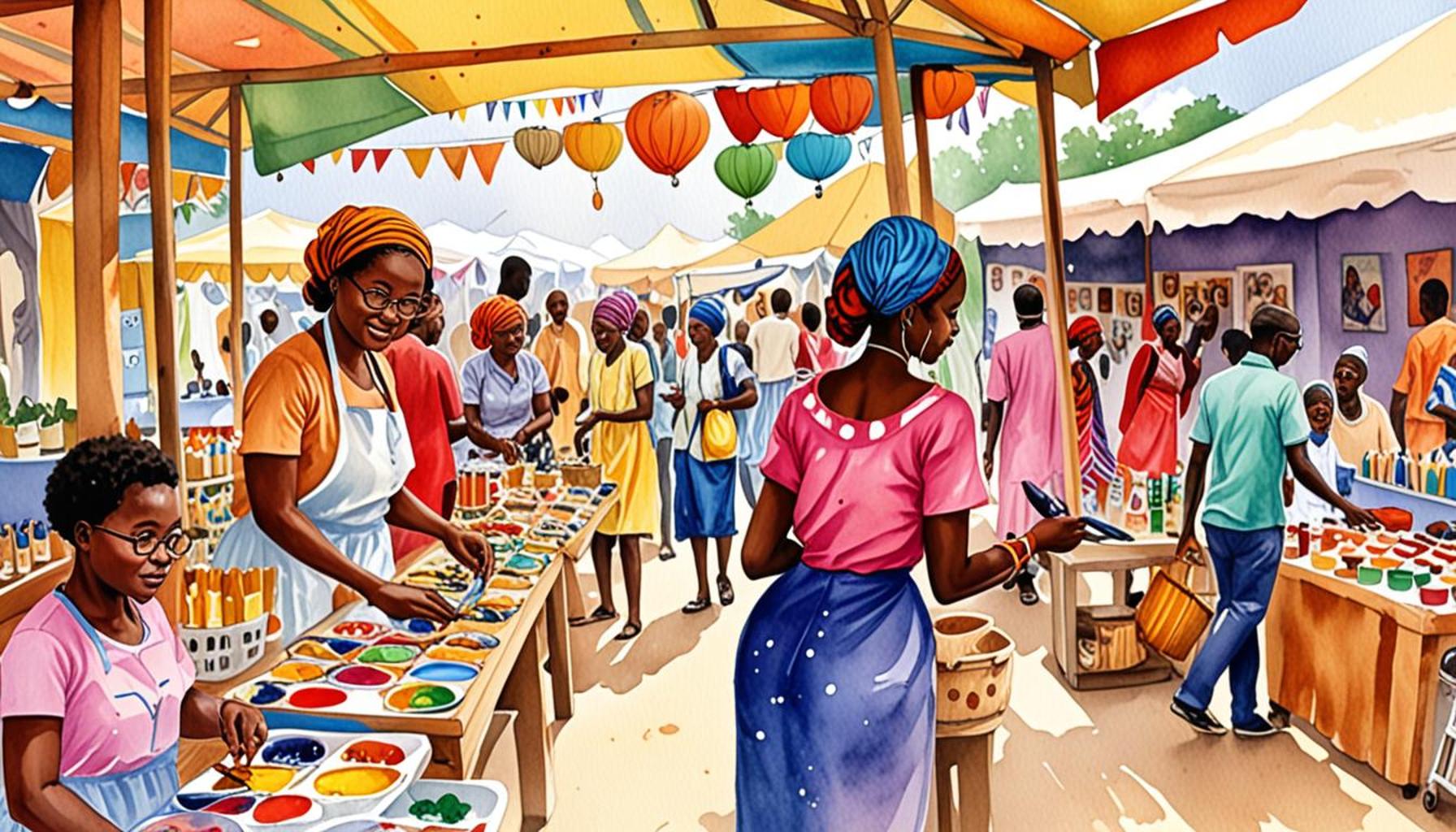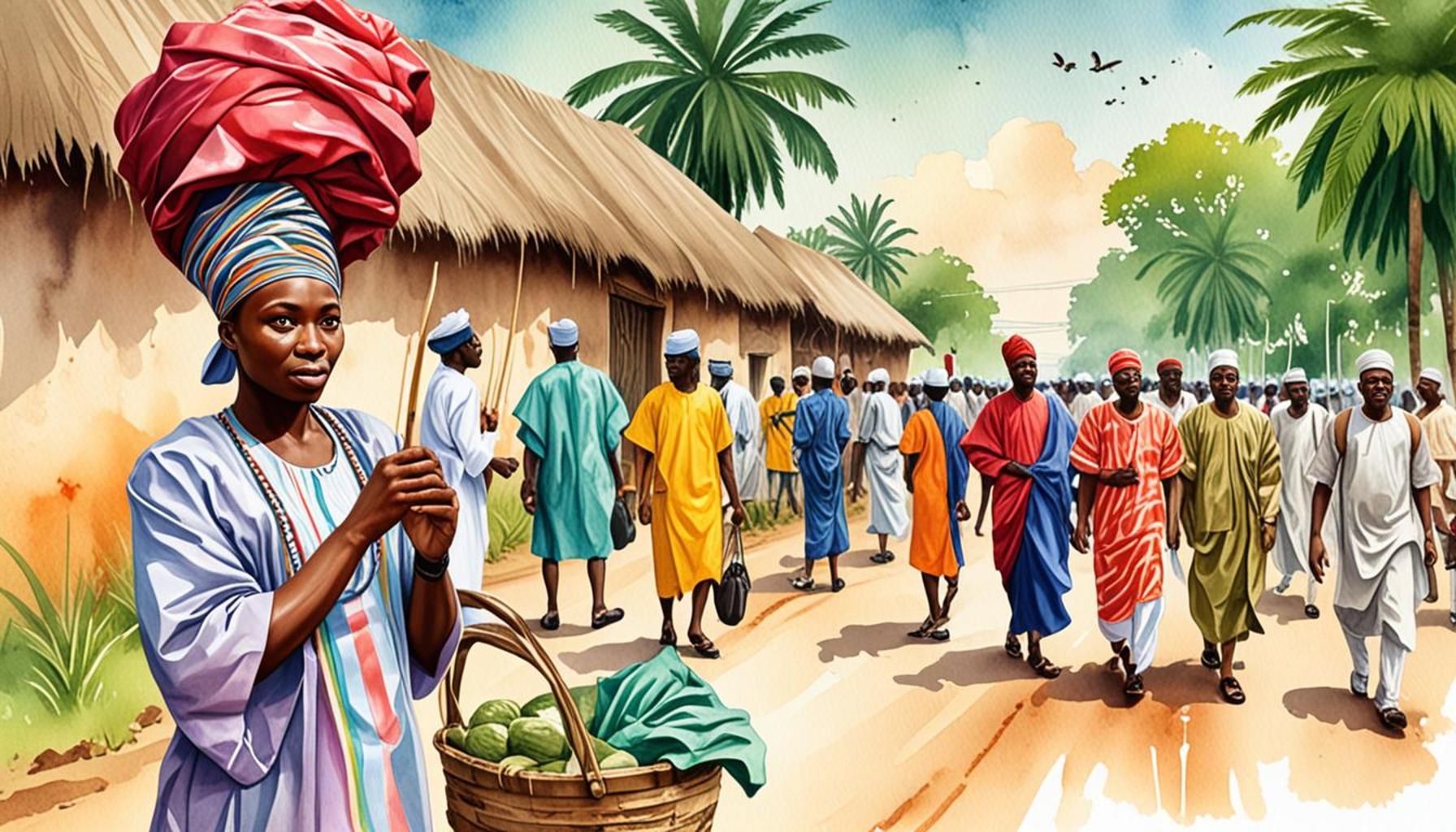Art and Craft Routes: Discovering Local Talents in Nigeria’s Markets and Studios

A Journey Through Nigeria’s Artistic Landscape
The art scene in Nigeria is an enchanting blend of history, culture, and innovation that permeates every part of the country. From lively craft markets filled with vibrant colors to the serene ambiance of artist studios, Nigeria’s artistry flourishes, embodying both its rich heritage and contemporary expressions. Artisans and artists channel their creativity, making a profound impact on local culture and global perspectives alike.
Nigeria’s artistic diversity is amply showcased in its various regions, each with unique art forms that reflect its heritage and historical journey. For instance, beadwork in the Northern region is renowned for its detailed and intricate designs that often tell stories of tradition, love, and personal identity. Not only do these colorful beads serve ornamental purposes, but they also signify social status and cultural rites, making each piece a significant contribution to the rich narrative of Nigerian life.
Meanwhile, in the Western part of the country, wood carvings are celebrated as a vital art form that captures the essence of ancestral lore. Artisans carve intricate designs that depict cultural symbols, deities, and historical events. These carvings are not just decorative; they also serve functional purposes, illustrating a deep connection between art and everyday life in communities.
In the East, the textile arts shine brightly, with local artisans producing vibrant fabrics adorned with distinct patterns that speak to cultural identity and artistic intention. The use of tie-dye techniques, particularly among the Igbo people, creates irreplaceable textiles that can transform both traditional attire and everyday clothing into wearable pieces of art.
Visitors exploring these various art and craft routes are offered a unique opportunity to support local talent while gaining an enriching understanding of Nigeria’s diverse cultural identity. Engaging with artists in their studios, witnessing the meticulous techniques employed, and understanding the stories behind each creation can create an unforgettable experience. Each brushstroke and intricately crafted piece narrates tales of resilience, joy, sorrow, and celebration woven into the fabric of Nigerian life.

As we navigate through Nigeria’s vibrant markets and studios, be prepared to uncover hidden gems that showcase the extraordinary talents thriving within the local art scene. The inspiring artisans devoted to their craft, often marrying traditional techniques with modern aesthetics, invite you to participate in this dynamic discourse of creativity. Open your heart and embrace the stories, the craftsmanship, and the spirited expression that fuel Nigeria’s thriving art ecosystem.
YOU MAY ALSO LIKE: Read read another article
Exploring Nigeria’s Craft Markets
Nigeria’s craft markets serve as vibrant epicenters of creativity, where the essence of local culture is beautifully encapsulated in every handmade piece. These markets, often bustling with energy, offer visitors not just a chance to purchase art, but an immersive experience of the traditions and skills passed down through generations. Among the most popular craft markets, the Lekki Art and Craft Market in Lagos stands out as a treasure trove filled with unique artifacts, jewelry, and textiles that showcase the creativity of local artisans.
Visitors to these markets can expect to find a wide range of artistic endeavors, including:
- Beaded Jewelry: Handcrafted from local materials, each piece tells a story of cultural significance and personal expression.
- Traditional Masks: Carved from wood and painted in vibrant colors, these masks often serve ceremonial purposes and reflect the spiritual beliefs of various ethnic groups.
- Pottery and Ceramics: Skillfully handcrafted and often adorned with intricate designs, Nigerian pottery serves both decorative and functional roles in homes.
Another remarkable market is the Oshodi Market, where textiles narrate tales of heritage through colorful patterns and meticulously embroidered designs. Engaging with the local vendors not only opens pathways to discovering unique art forms, but it also fosters connections between artists and customers. Each interaction is an opportunity to learn, to listen, and to appreciate the craftsmanship that goes into every creation.
Inside the Studios: A Personal Encounter with Artisans
As fascinating as the markets are, venturing into the studios of talented artists provides a profound glimpse into the creative processes behind the works of art. In these intimate settings, artists often share their inspirations, techniques, and personal anecdotes that breathe life into their creations. For example, many painters in Nigeria blend traditional motifs with contemporary concepts, resulting in artworks that resonate with both local and global audiences.
Visiting artist studios, such as those found in Abuja’s Art District, allows enthusiasts to witness the artisans at work. This direct engagement aids in understanding the intricate techniques involved and the time devoted to master each skill. Here, visitors may also take part in workshops that provide insight into:
- Mixed media art that utilizes everything from textiles to recycled materials.
- Printmaking techniques that bring vibrant designs to paper and fabric.
- Painting styles that capture the richness of everyday Nigerian life.
The stories shared in these studios resonate deeply, inviting visitors to appreciate the deep-rooted significance of each artwork. Local artisans are passionate about preserving Nigerian heritage through their craft, often instilling cultural narratives and community values within their pieces. Supporting these creators not only preserves the traditional arts but also empowers them economically and socially.
A journey through Nigeria’s craft markets and artist studios is more than just a casual stroll; it is a celebration of creativity and a testament to the country’s rich artistic landscape. As you explore, take the time to connect with the artisans, understand their processes, and, most importantly, be prepared to encounter the unique stories behind each creation that enriches the tapestry of Nigerian culture.
| Local Talent | Supporting Features |
|---|---|
| Artisanal Skills | Discover the craftsmanship behind unique local products. |
| Cultural Heritage | Experience the rich history reflected in the artworks. |
Exploring the Art and Craft Routes in Nigeria unveils a treasure trove of local talents awaiting discovery. The vibrant markets and studios scattered across the country serve as a platform for artisans to showcase their exquisite craftsmanship. Each handcrafted piece not only represents artistic innovation but also a deep-rooted connection to Nigeria’s cultural heritage. Moreover, supporting these artisans strengthens the local economy and fosters a sense of pride in indigenous practices.Visiting these markets, you immerse yourself in an environment where creativity thrives and traditional skills are celebrated. Engaging with artisans offers a unique opportunity to understand the stories and inspirations behind each art piece. This interaction enhances the appreciation of local art, while also encouraging sustainable practices that benefit communities. From intricate beadwork to stunning pottery, the enchanting art forms reflect a blend of age-old traditions and contemporary influences, making every journey along these routes a remarkable experience.
CHECK OUT: Click here to explore more
Art Exhibitions and Cultural Festivals: A Glimpse into Nigeria’s Artistic Community
Beyond the bustling craft markets and intimate artist studios, Nigeria hosts a myriad of art exhibitions and cultural festivals that further highlight the country’s rich artistic heritage. These events provide an excellent platform for both emerging and established artists to showcase their work while engaging the public in the appreciation of art. One such notable event is the National Arts and Culture Festival, held in various states across Nigeria. It celebrates diverse art forms, including dance, theater, visual arts, and crafts, attracting thousands of visitors eager to explore local talents.
Another prominent platform is the Art Twenty One showcase in Lagos, which focuses on contemporary art and innovation. During these exhibitions, visitors can engage with installations that often challenge societal norms and provoke thought on current issues. The fusion of contemporary art with traditional influences creates a dynamic and compelling narrative about Nigeria’s identity.
Additionally, arts festivals like FESTAC (Festival of Arts and Culture) serve as a major cultural highlight, featuring performances by local musicians, dramatists, and dancers alongside visual art exhibitions. These events foster unity and appreciation for diverse cultural expressions, enticing attendees to partake in workshops, discussions, and live demonstrations by artisans. Visitors become part of a larger community celebrating creativity, which strengthens the social fabric of Nigeria.
Supporting Local Artisans: Crafting a Sustainable Future
The impact of purchasing local art and crafts extends beyond aesthetics; it plays a pivotal role in the sustainability and growth of artisans’ livelihoods. By choosing to buy from local markets and studios, consumers can actively contribute to the economic empowerment of these artists. Various organizations have emerged to support artisans, such as Artisans for Artisans, which works to improve market access and enhance skills through mentorship programs. These initiatives not only uplift individual artists but also contribute to the preservation of traditional craftsmanship that is crucial to Nigeria’s cultural identity.
Nigeria’s handmade crafts can also gain international recognition through online platforms such as Etsy and Amazon Handmade, where artisans can market their products to a global audience. This exposure not only broadens their customer base but also encourages cultural exchange and appreciation for Nigerian artistry worldwide. Artisans who harness digital platforms create a bridge between local craftsmanship and international art lovers, promoting Nigeria as a hotspot for authentic and captivating art.
Moreover, sustainable practices are becoming increasingly important within Nigeria’s crafting community. Artisans are discovering ways to incorporate eco-friendly materials and processes into their work. For example, some textile makers are using organic dyes sourced from local plants, while woodworkers are committed to sourcing timber from sustainable forests. This commitment to environmental responsibility resonates with today’s conscious consumers, reinforcing the connection between art, culture, and sustainability.
As visitors embark on a journey through Nigeria’s art and craft routes, they uncover not only beautiful creations but also the stories, struggles, and triumphs of the individuals behind them. The art scene in Nigeria is a thriving tapestry interwoven with rich traditions and innovative expressions, waiting to be explored and celebrated by those who seek to support local talents and engage genuinely with the culture.
SEE ALSO: Click here to read another article
Conclusion: Embracing the Essence of Nigeria’s Artistry
In conclusion, navigating the art and craft routes of Nigeria offers a remarkable opportunity to engage with the heartbeat of its cultural identity. From the vibrancy of local markets to the intimate settings of artist studios, each encounter unveils the unique narratives that shape the lives of artisans. As we immerse ourselves in this rich tapestry of creativity, we not only celebrate the extraordinary talents within our communities but also participate in a larger movement that champions their economic sustainability.
The significance of art extends beyond mere aesthetic appreciation; it is a testament to our heritage, craftsmanship, and innovation. Events like the National Arts and Culture Festival and platforms such as Art Twenty One play crucial roles in promoting this culture, showcasing a range of artistic expressions that are as diverse as the nation itself. These gatherings not only attract local audiences but also become a magnet for international art aficionados eager to discover the essence of Nigerian creativity.
By embracing and purchasing local craft, we actively contribute to the livelihood of these artisans and foster a sense of community that appreciates the painstaking work behind each piece. As sustainable practices become integral to our crafting community, we are called to be mindful consumers who recognize the impact of our choices. Thus, as we explore Nigeria’s art and craft landscape, let us embark on a journey of discovery, supporting local talents while honoring the traditions that embody Nigeria’s rich heritage for generations to come.


